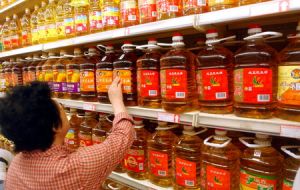MercoPress. South Atlantic News Agency
Argentina’s boost-industry import restrictions estimated in one billion US dollars
 China responded to previous trade barriers by banning soy-oil imports for six months
China responded to previous trade barriers by banning soy-oil imports for six months Imports restrictions imposed this week by the Argentine government with the purpose of “preserving the re-industrialization process” cover approximately 200 products totalling annual imports of a billion US dollars, according to preliminary reports.
Once the measures described as ‘non automatic licences’ become effective in two weeks time they will include a total of 600 products. The non automatic licences system is contemplated under WTO rules and was first implemented by Argentina in 2005.
According to Ambito Financiero, a Buenos Aires financial publication close to the administration of President Cristina Fernandez de Kirchner the measures are targeted mainly to four markets, China, United States, European Union and Brazil and “the government is prepared to confront the situation”.
Argentina allegedly is only prepared to discuss the issue with China and Brazil, the country’s main trade partners. Regarding the US and the EU, the argument is “simple and direct”: those are markets where Argentine food exports and other commodities face access barriers.
Among the items which will need special consideration before they are allowed into Argentina are: high range automobiles; mobile phones, DVDs., recorders, cutlery, crockery, glass, crystal, mirrors, auto parts cardboard containers, paper products, textiles, certain metal products, casts and moulds, motorcycles, bicycles and bike spares. Before any of these products can be introduced to Argentina there will be an assessment of the domestic supply and market.
Textiles, glass and plastic were some of the industries to openly support and praise the government for restricting imports.
Minister of Industry Debora Girogi said experience shows that those sectors submitted to the imports non automatic licensing system are the ones which most contributed to substitute imports, such is the case of the auto industry, electronics, foot wear, textiles and the so called home white line appliances.
Ms Giorgi mentioned specifically the cases of denim (textiles); sports foot wear; appliances (fridge, dish washer, laundry washers, air conditioners), mobile phones, “all of them sectors with manufacturing capacity to supply the domestic market and where there have been the most investments, including from overseas”.
However a bumpy road could be ahead since previous attempts to restrict imports led to confrontation with Brazil and China.
In 2009, Argentina raised barriers against imports from both countries in an effort to protect local manufacturers during the global economic crisis. Brazil retaliated with similar measures against Argentine goods, mainly agricultural products and car parts. In the end, diplomacy prevailed and commerce between the two neighbors has since prospered, though Argentina ran a trade deficit of 4 billion US dollars with Brazil in 2010.
China responded to Argentina's trade barriers by refusing to import Argentine soy-oil for six months last year.
Argentina posted a trade surplus of 12.06 billion USD in 2010, down from 16.89 billion in 2009 and 12.56 billion in 2008, according to the national statistics agency, Indec. The Central Bank of Argentina expects the trade surplus to shrink further this year to around 10 billion USD.
Last year, exports rose 23% to 68.5 billion USD led by automobiles, grains and agricultural products like soy-oil. But a booming domestic economy that likely expanded 9% last year fueled a surge in imported goods. Imports grew 46% to 56.44 billion USD, with intermediate goods used by local industry, capital goods, and automobiles posting the biggest gains.
The Argentine central bank also regularly intervenes in foreign-exchange markets to foster a gradual peso depreciation to keep export-oriented manufacturers competitive and protect the local industry from imports. However, inflation is slowly eroding the competitiveness that Argentina's manufacturers have enjoyed from a weak nominal exchange.




Top Comments
Disclaimer & comment rules-

-

-

Read all commentsShould help Mercosur/EU talks along nicely :-)
Feb 17th, 2011 - 01:32 am 0Yes, because Argentina is a member of Mercosur :)
Feb 17th, 2011 - 01:58 am 0Looks like a trade war has just started. Let's bet, who's going to win, Argentina or the rest of the gang (Brazil, China, USA and EU).
Feb 17th, 2011 - 03:59 am 0Commenting for this story is now closed.
If you have a Facebook account, become a fan and comment on our Facebook Page!